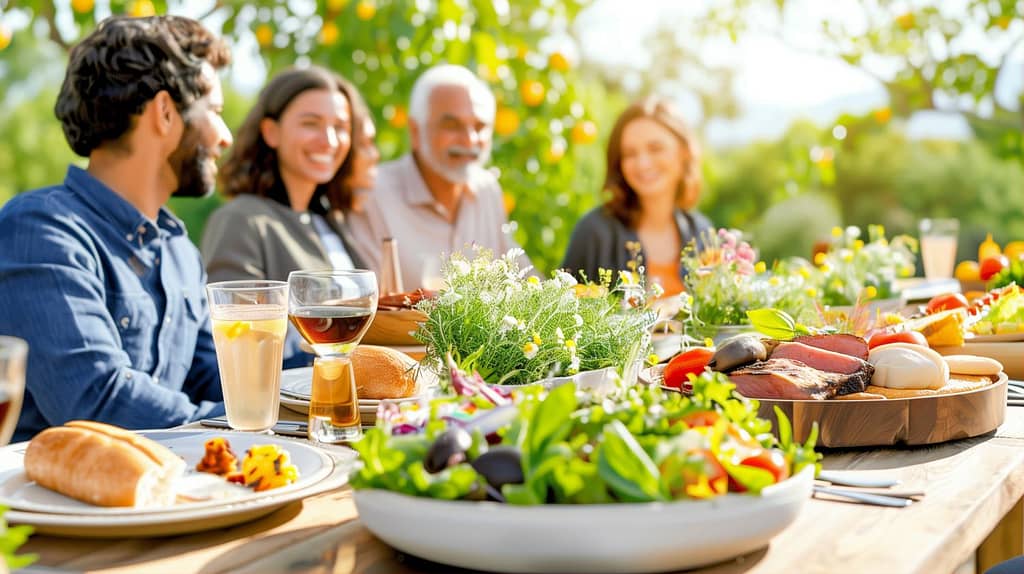Last Updated on February 27, 2025 by Tanya Janse van Rensburg
Outdoor entertainment is a beautiful way to connect with friends and family in a relaxed and inviting setting.
However, hosting large gatherings can sometimes generate significant waste and energy consumption, impacting the environment.
Fortunately, with some planning and conscious effort, you can host memorable eco-friendly gatherings that minimize your environmental footprint.
From sustainable furniture to reducing waste and offering plant-based options, here are some practical tips for making your next outdoor event enjoyable and sustainable.

The first step toward eco-friendly outdoor entertainment is assessing the sustainability of your backyard.
Start by looking at the materials used in your outdoor space, including furniture, ornaments, and lighting.
You may be surprised by the variety of eco-friendly options available.
When selecting furniture and décor for your outdoor area, choose items made from sustainable materials like bamboo, reclaimed wood, or recycled metal.
Avoid plastic or synthetic materials that are not biodegradable.
If possible, look for locally made or upcycled furniture that reduces the environmental impact associated with transportation and production.
Hosting an evening gathering?
Switch to solar-powered or LED lighting. Solar-powered lights bypass the need for commercially generated electricity, making them eco-friendly and cost-effective.
LED bulbs use significantly less energy than traditional incandescent bulbs and last longer, reducing the need for frequent replacements.
Outdoor events sometimes require additional climate control, like heating or cooling, especially during extreme temperatures.
Instead of using energy-consuming outdoor heaters or air conditioning, consider using natural solutions such as shade structures, pergolas of different designs and sizes, or outdoor fans powered by solar energy.
Blankets or fire pits (using sustainable wood) can also keep guests warm in cooler weather.
Installing rain barrels under your home’s gutters is an easy and cost-effective way to reduce your reliance on municipal water systems.
Also, rain chains should be installed to direct water from the gutter into the barrels.
You can use this water to pre-wash tableware and furniture after your event.
Gatherings aside, you can also look into connecting this water to toilet cisterns and, of course, for garden irrigation.

Single-use disposable tableware may be convenient, but it can create a lot of harmful waste, especially when entertaining large groups.
Some ideas to reduce your environmental impact are:
Choose reusable and cleanable plates, glasses, and cutlery made from stainless steel, ceramics, or glass.
If you're hosting a large group, consider borrowing extra sets from friends or renting tableware from local vendors.
If reusable items are impractical, disposable tableware made from materials like bamboo, palm leaves, or cornstarch is available in biodegradable or compostable options.
These are organic, break down much faster than plastic, and don’t release harmful environmental toxins.
In some cases, you might be unable to avoid using disposable products.
If so, take steps to reuse or recycle them as much as possible, even if they’re made from sustainable materials:
Encourage guests to reuse cups and plates throughout the event to minimize waste.
Provide a marker pen so guests can label cups with their names, making it less likely that they will use more than one.
Set up clearly labeled recycling stations so guests can quickly sort paper, plastic, and glass.
Be sure to educate your guests about which items are recyclable and which aren’t to avoid contamination in your recycling bins.

Grilling is a staple of outdoor entertaining, but traditional charcoal can negatively impact the environment.
Most commercial charcoal is made from wood and other organic materials that release harmful pollutants and particles when burned, contributing to air pollution and increasing carbon emissions.
Additionally, charcoal production often involves deforestation, further harming the environment.
If you prefer the smoky flavor that charcoal grilling offers, consider using sustainable charcoal options:
This type of charcoal is made from pure hardwood and burns cleaner than traditional briquettes, producing less ash and fewer emissions.
However, it is only sometimes from sustainable logging operations.
This option is made from discarded coconut shells and provides a sustainable alternative that repurposes waste materials.
Look for charcoal products labeled as sustainably sourced or certified by organizations like the Forest Stewardship Council (FSC).
This ensures that the wood used comes from responsibly managed forests.
Alternatively, you can invest in electric or gas grills, which tend to have a smaller carbon footprint than charcoal grills.
Both produce fewer emissions and allow for more precise temperature control, leading to efficient cooking.

When selecting barbecue tools, choose durable, long-lasting options that can withstand multiple uses, reducing the need for replacements:
Stainless steel barbecue tools are durable, rust-resistant, and recyclable.
Bamboo tools are another eco-friendly option since bamboo is a fast-growing renewable resource.
Opt for reusable skewers, grilling mats, placemats, and eco-friendly utensils rather than single-use, disposable options.

The food you serve plays a significant role in the sustainability of your gathering.
Supporting local farmers and food producers helps reduce the carbon footprint of transporting food long distances and boost the local economy.
Visit farmers’ markets or local farms to purchase fresh produce, meats, and dairy products.
Local foods are often fresher, require less packaging, and have a lower environmental impact than imported goods.
In addition to buying local, focus on seasonal fruits and vegetables.
Seasonal produce is often grown without energy-intensive greenhouses and is harvested at peak ripeness, resulting in better flavor and nutrition.

Adding plant-based meat substitutes to your menu is another great way to reduce your event's environmental impact.
The production of plant-based meats generally requires fewer resources and generates fewer emissions compared to traditional meat production.
Offer a mix of traditional meats and plant-based alternatives like veggie burgers, plant-based sausages, and grilled vegetables.
This will cater to a broader range of dietary preferences and introduce your guests to more sustainable eating options.

When offering food, set up a self-service buffet so guests can choose their desired portions.
This will help minimize food waste.
When serving themselves, guests are more likely to take only what they need, reducing the amount of uneaten food in the trash.
If there are leftovers, encourage guests to take them home.
Either provide invitees with sustainable containers or include a note in your invitation suggesting they bring their own.
Refrigerating leftovers for future meals reduces the need to cook again, conserving energy in the long run.

Food scraps and organic waste are inevitable when hosting a gathering, but you can compost them instead of sending them to the landfill.
Set up a separate bin for organic waste like fruit and vegetable peels, coffee grounds, and eggshells.
Let your guests know what can and cannot be composted.
If you’re an avid gardener, you can use the compost to enrich your soil, completing the cycle of sustainability.

Transportation can significantly contribute to the carbon footprint of any gathering.
To reduce this impact, encourage your guests to carpool, walk, bike, or use public transportation to get to your event.
This reduces the number of cars on the road and lowers emissions.
Today, it’s common for invitations to be sent via group chats, which gives guests the perfect platform for coordinating ride-sharing.
If your event location is accessible by public transit, provide information on routes and schedules to help guests choose environmentally friendly transportation options.
If your home allows, consider offering sleeping arrangements so they don’t have to resort to public transport late at night.

If you’re sharing the cost of the event with your guests, consider adding an option to contribute to carbon offset projects.
These projects help reduce global carbon emissions by funding renewable energy, reforestation, or energy efficiency initiatives in zones where transitioning away from fossil fuels is more urgent.
Alternatively, if you typically give a parting gift to each invitee, tell them in the invite that instead, you will donate on behalf of each guest who confirms attendance.
Choose a reputable organization that supports verified carbon offset projects.
Let your guests know that part of their contribution will reduce the event’s carbon footprint, making your gathering even more meaningful.

With mindful planning, you can create an enjoyable and sustainable event that positively impacts the environment and your guests.
The small changes above can make a big difference, particularly if they inspire others to do the same.
Here’s to helping to create a greener future, one event at a time!